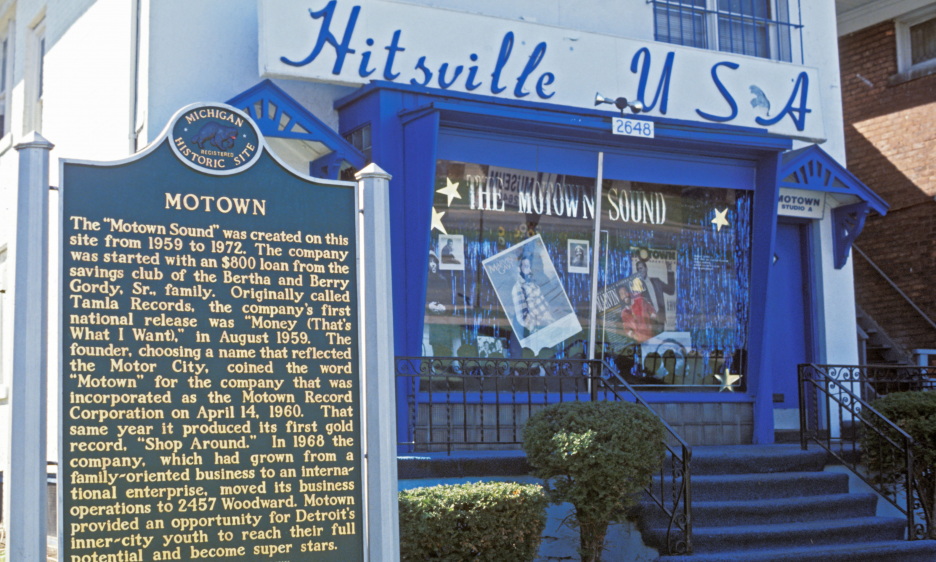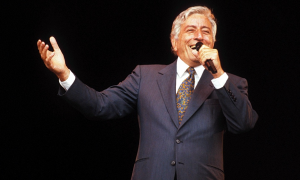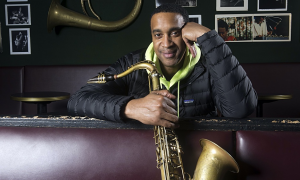Home » Jazz Articles » Beauty, Love and Justice: Living A Coltranian Life » The Gift: Motown Unwrapped
The Gift: Motown Unwrapped

Courtesy Jim West
The Children Are Listening
"What are you listening to Christy?" my mother asked. "Cousin Ray gave me this album, it is the group the Temptations," I replied. It was around 1968 and I was continuing to build my record collection at eleven years old. 'I Wish it Would Rain' was spinning on my record player. The cover was a photo of five black men, members of the incredible Temptations. My mother smiled when I was enjoying music as she too loved music and my father adored it even more. Music always seemed to bring a common bond into my family life from generation to generation. The story goes she was reading Ebony on the beach at Coney Island, my dad was intrigued and introduced himself to her. The two Italian-Americans were both raised in families who loved great music, especially jazz and the blues. My mother was a fan of the crooner Billy Eckstine and my father adored Sammy Davis Jr. and Louis Armstrong. I was only a child but I was getting a great education in phenomenal music. I am the daughter of that couple who eventually married after meeting on that beach.People from many backgrounds lived in the Mill Basin neighborhood of my youth and we embraced one another. It was a time of revolution for women and black people demanding equal rights. Civil Rights and Women's Rights began to take root. The rhythm and blues, blues, rock and roll, soul, and even pop music would grab me and never let go. I want to take credit for bringing the sound of Motown to my family and many of my friends. The Temptations would open my musical palette even deeper. I would listen to "Cloud Nine," "My Girl," "Papa was a Rolling Stone" on repeat, and I would collect more of the songs recorded by the Temptations.
I was already a fan of Motown's Supremes who were part of my growing record collection. Every Saturday afternoon, I would join two of my school friends and sing along with the Supremes in my friend's basement imitating the dancing moves of this incredible group of female singers as the records spun on a portable record player. We wore my friend's father's white crisp dress shirts which were fresh out of the dryer in the laundry room, we thought we looked like ghosts in these shirts that were way too big for little girls. We named ourselves the Ghost Girls, but we felt like we were mini-Supremes.
Decades later I saw the Supremes live and one of the members said to the audience, "Remember when you would grab a hairbrush for a microphone and pretend you were a Supreme." Oh my God, how did she know? I giggled as I sang along with the Supremes and the entire audience as we belted out the lyrics. From my days singing in the basement with my friends pretending I was in the Supremes with Diana Ross, Florence Ballard, and Mary Wilson, the girl groups gave me a platform to not only sing as a child with my friends but also to see female singers working together creating music that I loved. Singing "Stop! In the Name of Love" at eight years old was sheer joy!
Motown music would continue to bring me joy during my junior high school years as I listened to the Jacksons, and then when I entered high school and into my college years, I felt the music of Smokey Robinson and Marvin Gaye ignite my heart. The blues, rhythm and blues, and gospel mixed with jazz made me a fan of Motown. Stevie Wonder, the Dells, the Stylistics, The Tramps, Harold Melvin, and the Blue Notes, Teddy Pendergrass, Lionel Richie, James Brown were all in my record collection, a variety of musicians coming from different music labels but the musicians that came specifically out of Motown stayed with me.
The Kennedy Center Honoree
The miracle of Motown came to the world through the one and only Berry Gordy Jr in the early 1960s. It is great to know that Mr. Gordy is a Kennedy Center honoree and received this honor through President Joseph Biden. Attending the gala to help celebrate this moment were his old friends Smokey Robinson and Stevie Wonder, who also were Kennedy Center recipients on prior occasions.It made me smile as I watched Berry Gordy receive this thank you from America. As he beamed receiving his award, his grinning face was hidden by a mask, he had to be happy because it is a great American honor. Our country does appreciate the master artists and those who contribute to the production of magnificent art. The official statement from the Kennedy Center about Mr. Gordy is, "A man of vision, drive, talent, and determination, Berry Gordy a boxer, songwriter, producer, director, entrepreneur, and founded Motown—the hit-making enterprise born in Detroit, Michigan. He discovered and nurtured the careers of Smokey Robinson and The Miracles, Diana Ross and The Supremes, Stevie Wonder, Michael Jackson and The Jackson 5, Marvin Gaye, Lionel Richie, and the Commodores, Martha Reeves & the Vandellas, The Temptations, Gladys Knight & the Pips, and many other music greats and is responsible for the 'Motown Sound' that reached out across a racially divided, politically and socially charged country, to transform popular music..." It is a great nod to him and his long challenging journey in the American experience and shows gratitude to the entire Motown team who helped Berry Gordy create his transformative independent record label, some well-known artists and some not so famous, but all vital in the birth of the sound of Motown.
Black Music at Our American Core
The music followed me throughout my college years and helped me study believe it or not. I was able to stay focused and study because the music joyfully surrounded and swirled around me during the week, and then accompanied me out on weekends bringing me to my feet dancing at the disco. Dancing to Lionel Richie's "Brick House" seemed to be my theme song, I connected to it, the lyrics and the music made me feel confident and alive. I fell in love with WBLS and Kiss FM radio stations which helped create the soundtrack of my life. The stations played a variety of music created by urban artists. Bands like the Commodores and others signed to Motown and its subsidiaries entered the next stages of my life, moving into the 1970s and the 1980s. This music was part of the tapestry of genres weaved in helping me understand tenderness, love, romance, rebellion, and what helps a heart continue to beat.I admired the artistry of the illustrious Motown musicians. Some of the greatest became global legends as they were major contributors to the Motown sound and organization. Smokey Robinson, Stevie Wonder, and Marvin Gaye are American treasures. Reading the excellent book Where Did Our Love Go? :The Rise And Fall of the Motown Sound (Omnibus Press, 2003) by Nelson George and watching the illuminating heartfelt documentary Standing in the Shadows of Motown (2003) enlightened me and gave me a further understanding of the music I love. These sources document the brilliance, hard work, ambition, pain, and suffering of many people who contributed to the making of the sound of Motown.
In my research, I came to appreciate more musicians who were not as famous. I never heard of the names of the exemplary musicians who played on many of the songs for the Motown stars, but I heard their instruments played brilliantly. The genius of James Jamerson for example brought a signature sound to Motown which I enjoyed even though I only learned of his vital contribution to the structure of the music in my recent research. His early foundation rooted in jazz on the upright bass, mentored by Hank Jones, Kenny Burrell and Yusef Lateef in the clubs added to his immense contribution playing bass guitar for Motown. Marvin Gaye's 1982 album for CBS, Midnight Love moved me, Smokey Robinson's "Ooo Baby, Baby," and "Tears of A Clown" could make me pull my car over this very day and sing out the window. And if I want to ponder my heart, Stevie Wonder's "Ribbon in the Sky" will bring me to gentle tears of wonder and gratitude and the song still fills me up, it seems to help me emotionally along life's paths. Music accompanies my joyful celebrations and when things are tough guides me to always believe this life is worth living.
For me, Motown's gift of music is also a gift of poetry for America. In the 1970s acclaimed singer and composer, Bob Dylan was quoted stating that Smokey Robinson was America's greatest living poet. There is debate whether he actually made that statement but for me, it makes total sense to say that Motown's Smokey Robinson along with the other lyricists from Motown brought Americans the poetry which touches the souls of people who experienced these vibrant decades and as the country evolved into being a land that continues to be a majestic democratic experiment filled with people from so many backgrounds, we rise together. Such an opportunity for greatness lies in the peoples of America, and Motown's songwriters are part of that storytelling and education for the people who listen to the musicians who are indeed the vanguard of humanity.
Hitsville
The Gordy family had ancestors who were successful sharecroppers in the south and eventually would move north to Detroit to remove themselves from the Jim Crow south. Berry Gordy Jr. was raised in Detroit. He lived in a neighborhood with many gifted children who would soar through music. Many of these youngsters connected and became friends. Aretha Franklin's childhood home was the biggest house in the neighborhood. Her father, the acclaimed Rev. C.L. Franklin, was a religious leader in the area. Smokey Robinson remembers hanging out at their house as a child and first meeting young Aretha singing so exquisitely. Robinson became friends with Aretha Franklin's brother, and witnessed the virtuoso singer's brilliance even when she was a child.Berry Gordy was very close to his siblings. His sisters were a great support to him as he created the independent music label. The young ladies had a photo concession at the Flame Show Bar and this helped connect their brother to their musician friends. These connections benefited Gordy as he decided to take his career into songwriting. He found his footing and his purposeful path. The intricate growth of the now legendary independent record label brought the world some of the best artists of our time. The recording studios and offices of Motown began in humble beginnings. Gordy purchased a house in 1959 on West Grand Boulevard in Detroit, Michigan, it was the first headquarters for the Motown recording studio and office, and currently operates as a museum honoring the history of the music created there. It was there that Gordy invited more of his friends from the neighborhood to spread their artistic wings and show the world the gifts inside of them. That music created a genre that is celebrated throughout the world.
Gordy would remain close to many members of his Motown team throughout the decades of his life. Among his friends, he includes Stevie Wonder, the late Marvin Gaye, and Smokey Robinson. It is clear this group of friends challenged and supported one another to continue to elevate one another to reach their highest potential.
Fate would have it that in 1957 Gordy met the teenage Smokey Robinson who was trying to have his original songs heard. Gordy gave the young man a chance and mentored him in his songwriting. Gordy saw Robinson's songwriting talent and signed him to be part of Motown. Gordy who was only slightly older but already had written hit records helped guide young Robinson, who wrote tremendous songs for his group the Miracles, for himself, and other artists as well. "Tracks of My Tears" and "My Girl" are among my favorites. It is very cool to know that Robinson was also a Vice President at Motown and helped bring the organization to its legendary status over all these decades.
Stevie Wonder joined Motown as a child. He was known as Little Stevie. Wonder was blind and had an extraordinary ability in music. The team at Motown nurtured him musically and he grew into a consummate star who would grow into a magnificent American treasure, composer, songwriter, and singer.
Marvin Gaye's sultry and ethereal voice singing "God is My friend" or "Aint No Mountain High Enough" with Tammi Terrell are more of my favorites. It was the album in my collection I Want You that made Marvin Gaye one of my cherished Motown heroes. I was a college student in the late 70s studying economics and relished the great artists singing to me as I studied away, and the music helped me escape the mundane rules of life into the poetry of living in beauty and possibility. To me listening to Motown was an extension of my literature classes, it presented life in a poetic style set to the music. When Dance with Me came on the radio, I put down my books and started to dance and sing softly with Marvin's sweet voice.
Marvin Gaye the son of a minister was shot by his father during a family argument, . The 44-year-old son was tragically killed, but the music Marvin Gaye created keeps him with us. It is a bittersweet reality, he is gone too soon, but his gift lives on.
Berry Gordy moved his main Motown headquarters to California in 1972 and also expanded into creating films. And when I first started dating, one of the first dates I went on was seeing the legendary Diana Ross and Billy Dee Williams in Lady Sings the Blues. The film garnered five Academy Award nominations. Seeing Diana Ross on the big screen was like seeing a friend of the family.
The Sustained Connection Through America's Music
Motown music is an integral part of my personal life and the journey of the United States of America. In many ways, I learned about love and tenderness from the Motown stars, and that passion opened the door to rhythm and blues, the blues, soul, then of course jazz which educated me and brought me into a more spiritual realm. Motown also helped bring American citizens together in love with the music.I attended the Broadway play Motown the Musical in 2013. It told some of the important legendary stories of Motown. Marvin Gaye, Diana Ross, Berry Gordy and Smokey Robinson were all represented by actors. I loved it, but when the play referenced the 1968 assassination of Dr. Martin Luther King, Jr. the audience was reminded of the pain and suffering of that era.
Sitting across from me that very evening was the mother of Trayvon Martin. a young man who was tragically killed in 2012. He was just a teenager walking home from the store. I spoke to Sybrina Fulton briefly to offer my condolences, and tell her about the hope embedded in my Kids for Coltrane curriculum, the teaching through the arts curriculum that I brought to my students. She was very kind and gave me her contact information when she heard I was dedicated to the lives of children.
Motown takes on more socially aware lyrics over the years reflecting on an American culture that was trying to do better for all people. At first, Berry was not sure if Marvin Gaye's "What's Going On" would be good for his record business. Gordy and Gaye had a deep respect for one another and Gaye was married to Gordy's sister Anna. Motown opened up to more truth-telling, not just about falling in love, breaking up, and falling in love again, but it would also include the kind of love John Coltrane wanted us to connect to, the love of one another throughout the United States, and the struggle we face in our weaknesses and our strengths. I could hear Marvin Gaye singing in my head, "Mother, mother. There's too many of you crying, Brother, brother, brother, There's far too many of you dying, You know we've got to find a way, To bring some lovin' here today..." In the struggle, I know that we all must find the courage and empathy to never give up hope and in our way be a Coltranian force for good. Motown brings us the beat of America's hope and moves us to come together for the children and their futures.
Motown an American Treasure
Years have gone by since my youth, I left Brooklyn in 1989 to reside on Long Island and raise my family. I often attend shows which offer live music including showing up when members of the original Motown artists from my youth are on tour and drop by Long Island or Manhattan. I was thrilled to hear members of the original Supremes, the Four Tops, the Temptations, and when Smokey Robinson hit the stage at NYCB Theater in Westbury in 2015. I made sure I was in the first row so I could sing along with him. Such a gift to my life, a blessing to cherish the music in my youth and honor and respect it now.The magnificence of being American to me is that we are indeed from all different people and have an amazing opportunity to share our cultural roots. I know my ancestors emigrated from Italy to contribute and share in the American democratic experience. It was part of my grandparents' dream that their descendants would live in a land of opportunity and I am sure their vision included the joy in experiencing the creative arts. The United States of America, a country I am blessed to live in is a collaboration of rich cultures. I keep that vision in my heart, mind, and in my way, I honor my ancestors by staying focused on being committed to what it means to be American. Motown music lives inside my soul, it is a gift to me personally, and to everyone reading this column.
Sharing our favorite songs is always joyful but more than that I believe they unveil who we are deep down into our hearts and souls. For me, the way I express my love and feel life's experiences started a long time ago. I accomplish this as a writer, and the music that helped shape me offered words of strength, confidence, and courage to face the unvarnished truth. During this on and off time of social distance, perhaps sending a friend some of this great music will be a gift to their well-being and soothe some of the loneliness society is feeling. This fall I was sitting with a group of 6 fellow writers as we attended to our creative thoughts honing in on our writing at Sarah Lawrence Writing Institute in Westchester County, set in a gorgeous area in New York. Writer Kathy Curto who is an outstanding professor opens the space to courageous and intimate sharing for writers.
Attending the session on the Sarah Lawrence campus this fall would have me focus on another genre of writing, memoir. "Food, Music, and Intimacy: A Trifecta for the Senses" was the title of the workshop. Something interesting happened as we took turns sharing our improvisational work that day. Other writers in attendance chose to specifically write about the impact of Motown's music on life. This felt beautiful to me, and helped me realize even more how much the human heart shares great music in our journeys.
It reminds me of the words in Stevie Wonder's "Ribbon in the Sky," "Love, we can't lose with God on our side, we'll find strength in each tear we cry. From now on it will be you and I, And our ribbon in the sky, Ribbon in the sky, A ribbon in the sky for our love"
Modern Era
Music brings us together in good times and bad and reminds us of why our existence matters. As the pandemic challenges our country, our families, our way of life, the music heals us and helps us. I find my Spotify playlist growing as it becomes a foundation to keep me present and also hopeful. I do not ever want to forget the closeness of other human beings even at a time I am forced to not see many people I care about. So, when I Zoom call, when I simply can't be there in person, I remind the people I care about that there will be a day seeing one another in person more often will resume. It makes me think about Motown's song "Zoom" by the Commodores, definitely at the top of my hit parade. The Motown artists not only brought us great music but they are also brought witnesses to the experience of the human touch and the need to be in a loving place.The song "Zoom" written by Lionel Richie and Ronald LaPread is a yearning for the real thing, not wanting some alternate distant state of mind. The words are music for my poetic heart. "Zoom, I'd like to fly far away from here, Where my mind can see fresh and clear, And I'll find the love that I long to see people can be what they wanna be. Whoa, I wish the world were truly happy Living as one, I wish the world they call freedom, Someday would come Someday would come."
The Gift Unwrapped
Motown's music became the soul of America. Berry Gordy with his six-decade career being a songwriter and producing music created by extraordinary artists offers the gift that we unwrap every time we listen to one of the songs. As our lives change, music enters our minds in different ways, and for a variety of reasons. The music is a reminder to our country, that we are all in this together, and my hope and prayer are that the ribbon in the sky reminds us to be more loving and less divisive. The arts provide a beacon of light for humanity.Tags
Beauty, Love and Justice: Living A Coltranian Life
Christine Passarella
Motown
smokey robinson
Smokey Robinson and the Miracles
PREVIOUS / NEXT
Support All About Jazz
 All About Jazz has been a pillar of jazz since 1995, championing it as an art form and, more importantly, supporting the musicians who make it. Our enduring commitment has made "AAJ" one of the most culturally important websites of its kind, read by hundreds of thousands of fans, musicians and industry figures every month.
All About Jazz has been a pillar of jazz since 1995, championing it as an art form and, more importantly, supporting the musicians who make it. Our enduring commitment has made "AAJ" one of the most culturally important websites of its kind, read by hundreds of thousands of fans, musicians and industry figures every month.























